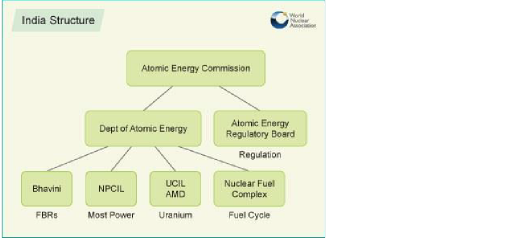Answer:
Lately there has been major need felt for expansion of nuclear facilities in India owing to the rising energy needs. Although these nuclear projects need to be transparent and open to scrutiny for which proper nuclear mechanisms must be in place to check whether the nuclear programs are: in sync with the needs of the masses, are accident secure, and are safe as per the safety standards practiced in country and worldwide.
The first demand to amend the nuclear regulatory mechanism in India was raised by Raja Ramanna Committee. The 2014 "Nuclear materials security Index” prepared by Washington based Nuclear Threat Initiative (NTI) has ranked India 23 out of 25 countries with weapons-usable nuclear material. It has been an issue of recent debates again after the recent Mayapuri radiation accident and Fukushima accident.
Currently Atomic Energy Regulatory Board (AERB) carries the regulatory mechanism regarding the safety and security measures of civil nuclear facilities. But, AERB is not able to deliver its duties properly.
There are several shortcomings that this mechanism faces:
1. The AERB is set up by government order and not by an act.
2. It is not an independent body and is under Department of Atomic energy.
3. It has to report to Atomic Energy Council rather than Parliament.
4. It can oversee only civil nuclear facilities and not the facilities related to defense and strategy etc.

Even CAG’s performance audit report in 2012 stated “The legal status of AERB as – an authority subordinate to central Government”. The CAG and Public Account Committee in its report criticized the AERB and proposed the formation of a Nuclear Safety Regulator Authority (NSRA). The positives of NSRA are that it will be:

♤ Set up by an act, and will not depend on the whims and fancies of Government order.
♤ The NSRA will report to parliament instead of reporting to Atomic energy commission.
But the recent bill proposed for the formation of NSRA too has several shortcomings:
♤ The NSRA Bill doesn’t clearly says that which facilities should be under its authority as the Bill says that the Central Government on the name of defense and security, exempt any radioactive material, nuclear material etc and the premises where these materials are found or the areas associated from the jurisdiction of the authority.
♤ NSRA is excluded from the purview of RTI Act.
An autonomous body to regulate the nuclear program is a drastic need if India wants to expand its nuclear energy sector which is effective and acceptable to people at large.
1. The selection of its members should be done by a body comprising the leader of Opposition and speaker of Lok Sabha.
2. The nuclear power should not be immune to scrutiny by civil society.
If NSRA as a body for nuclear regulation is provided with appropriate powers and its functioning is kept autonomous and transparent, it will not only ensure successful regulation of India’s nuclear program, but it will also enhance the image of India as a nuclear power in front of International community and NSG and it will also win legitimacy in the eyes of the masses.
